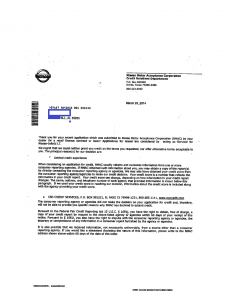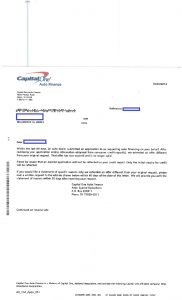At 8:59 A.M., my office phone rings. A frantic woman answers: “My car just got repossessed.”
As she proceeds to tell me her story, it becomes clear that this isn’t a garden variety repossession. Most repossessions, I confess, are totally legal. A car was bought on an installment contract; payments are due on the 1st of the month with a 10 day grace period; the buyer misses a payment, and 2 days after the grace period ends, the car is gone. Two days later, the finance company sends a letter confirming the suspicions: Yes, we came and got the car because you didn’t make your payment. We’re going to sell it in 10 days, and if you want it back you have to pay the full balance of the loan plus repo fees of $575.
But some repossessions are not legal. There are many ways a repossession can be illegal, but that’s a different subject for a different day. Suffice it to say that there are certain types of auto financing fraud where the end result is that a car gets repossessed when it shouldn’t.
So back to the lady who called as soon as business hours started because at 4:45 AM a stranger came into her yard and hauled her car off into the street. The first thing I ask was “Is there a reason they didn’t have the right to take your car?”
“Yes.” she says, “My first payment wasn’t even due yet.”
“OK Great!” I think, because this will be an easy case to prove. We make an appointment, and I tell her to be sure to bring all of her contract documents and other evidence.
“Well the paperwork was in the truck.” she says.
“What do you mean?” I ask, “So you don’t have a copy of your contract?”
“Well it was in the truck, and they took it.”
And so was her receipt for the down payment, and her title application, and pretty much everything that could possibly prove that she had any right to that vehicle. Which is really bad, because if you ever want to take any sort of legal action and have success, you’re going to need evidence. Without evidence, you will lose your case. It doesn’t matter how bad you’ve been done wrong or how evil they are and how righteous and innocent you may be. If you don’t have evidence, you lose. That’s all there is to it.
Now, there are ways to obtain documents from the dealership or finance company once you’re in litigation. But there are two big problems with not having your own evidence from the start. First, you’re trusting a fraudulent business to follow the rules of the judicial system and not destroy or alter the evidence you need. Second, without your contract, even a good lawyer is going to have a really hard time drafting your lawsuit in a way that ensures all your rights are protected.
So if you have a car that isn’t paid for, here’s one easy tip to protect yourself: Make Copies of ALL Deal Paperwork. You should do this the instant you sign everything. If the dealer isn’t videoing the paperwork signing, have a friend snap photos of everything with a phone.
Second, keep your originals in a safe place at your home, NOT in the vehicle. If you have some odd compulsion for keeping deal paperwork in a car, keep copies in the glove box. Not the originals. Remember that under Alabama law, the only deal paperwork you are required to have in your vehicle is your registration. And if you’re still in those first three weeks where you may not have gotten your registration certificate yet, then you need your title application instead. It acts as a temporary license to use that vehicle.


